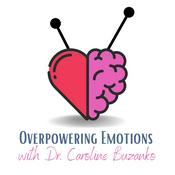Big feelings don’t go away just because we want them to. In this episode of Overpowering Emotions, Dr. Caroline Buzanko teaches radical acceptance as a practical skill for kids, teens, and the adults supporting them—educators, parents, counselors, and clinicians.
You’ll learn how to help young people spot when the “Hulk brain” is running the show, get the self-regulating brain back online, and choose a response that keeps them moving—without pretending the situation is okay. Dr. Caroline uses simple metaphors (rainstorms, quicksand, traffic jams, finger traps) plus classroom-ready scripts like “This is hard, and I can handle it.” You’ll also get hands-on tools: a control-circle exercise, a radical acceptance jar, coping cards, and “yet” language that builds confidence over time.
If you support kids who get stuck in “it’s not fair” loops, this episode gives you language, visuals, and practice ideas you can use the same day.
Homework for Adults
A) The Control Map (10 minutes, weekly)
Draw two circles: Inside = In my control, Outside = Not in my control
Put the current stressor in the middle, then list what belongs where.
Resource: paper + marker; optional printable you can make with two circles.
B) “BUT → AND” Script Practice (2 minutes a day)
Take common complaints and rewrite them out loud using AND. Try:
“This is hard, and I can handle it.”
“I’m feeling upset, and it’s okay—this is normal.”
“I can be uncomfortable and still be brave.”
Resource: sticky notes on a wall/mirror; coping cards in backpack.
C) “Yet” Statements + Progress Tracker (5 minutes, 2–3x/week)
Swap “I can’t” with “I can’t… yet.”
Track wins so anxiety doesn’t erase them.
Resource: a simple chart with columns: What I’m working on / What I tried / What helped / What changed.
D) Radical Acceptance Jar (weekly celebration)
Kids write one moment they didn’t like, accepted, and kept going.
Pick a few each week and celebrate effort, not results.
Resource: jar + slips of paper; optional stickers for effort.
E) “Rain vs. Umbrella” Daily Check-In (30 seconds)
Ask at dinner or after school: “What was your rain today? What was your umbrella?”
F) Role-Play Micro-Frustrations (3 minutes)
Practice with tiny stuff: marker color, waiting a turn, a plan change.
Use the same closing line: “I don’t like it, but I can handle it.”
Resource: a short list of role-play prompts on your phone.
Enjoying the show? Help out by rating this podcast on Apple to help others get access to this information too! apple.co/3ysFijh
Follow Dr. Caroline
YouTube: https://www.youtube.com/@dr.carolinebuzanko
IG: https://www.instagram.com/dr.carolinebuzanko/
LinkedIn: https://ca.linkedin.com/in/dr-caroline-buzanko
Facebook: https://www.facebook.com/DrCarolineBuzanko/
Website: https://drcarolinebuzanko.com/
Resources: https://drcarolinebuzanko.com/resources/articles-child-resilience-well-being-psychology/
Business inquiries: https://korupsychology.ca/contact-us/
Want to learn more about helping kids strengthen their emotion regulation skills and problem-solving brains while boosting their confidence, independence, and resilience? Check out my many training opportunities! https://drcarolinebuzanko.com/upcoming-events/



